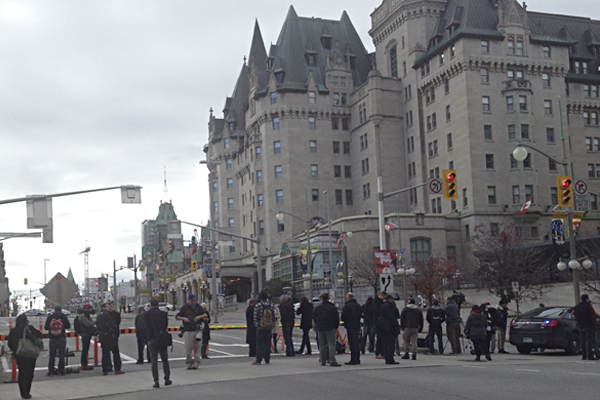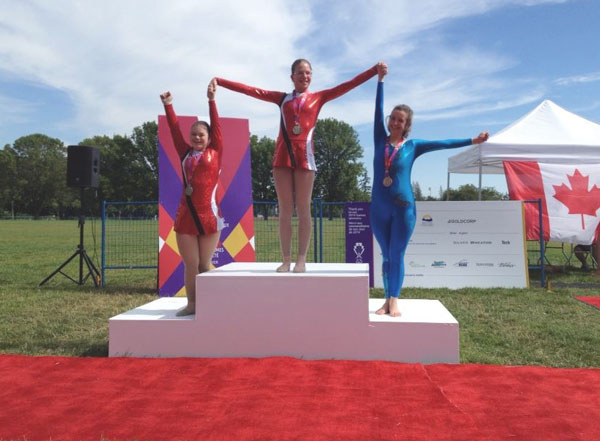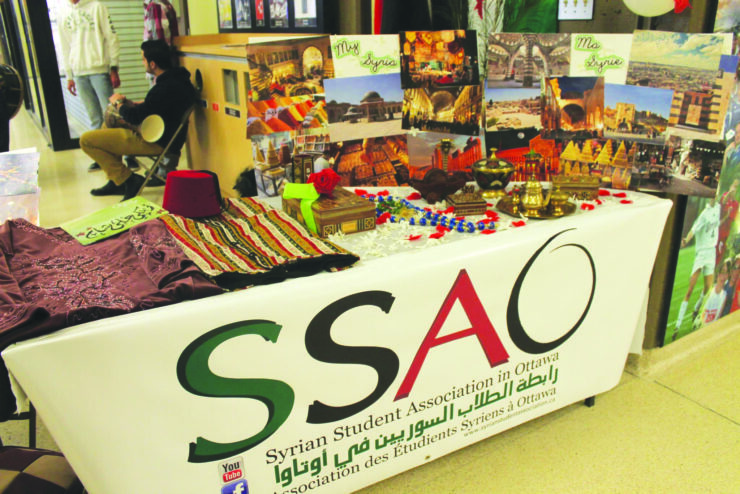Reports indicate many didn’t heed safety protocol during downtown gun threat
Photo: Spencer van Dyk
Michael Hess was in the halls of Lees campus when downtown Ottawa went under lockdown after the fatal shootings that took place Oct. 22, and he wanted to help.
Hess, an Ontario-licensed security guard and second-year criminology student, approached the University of Ottawa’s security staff to volunteer by ensuring staff and students around campus were following protocol.
Although he said the university and its security were prepared for the situation and handled it well, he couldn’t quite say the same about everyone on campus.
“When I told people to please follow lockdown procedures, I don’t know if it’s just because they didn’t take me seriously because I was technically a student, but none of them even seemed to know what exactly that meant,” he said.
An unidentified gunman fatally shot Cpl. Nathan Cirillo at the National War Memorial, then stormed Parliament Hill that Wednesday shortly before 10 a.m. Sergeant-at-arms Kevin Vickers then shot and killed the shooter in an ensuing gunfight inside Parliament’s centre block.
As police were seeking other potential threats, the university joined a lockdown of the downtown core in an effort to keep people inside and safe.
The university alerted students and staff to the lockdown by email at 11:02 a.m., and by social media a few minutes later, about an hour after the shooting started.
The university also cancelled all classes and midterm exams that day, including those set to take place after the lockdown was lifted five hours later at 4:02 p.m.
“The university acted quickly. Our emergency protocol was activated immediately,” read a U of O statement issued that afternoon. “We ensured our faculty, staff, and students received relevant information as quickly as it was made available. We maintained contact with the Ottawa Police Service throughout the day.”
But whether staff and students actually followed lockdown procedures seemed to vary, according to reports from students on campus at the time.
Some said the lights were off, windows and doors shut, and those inside told to keep quiet and remain where they were. One described a “strict lockdown” during which a professor was scolded just for peeking out the door.
Kate Seally, a fourth-year history student working in Desmarais, said her office had locked the doors and blocked the windows as instructed, and took in students passing by in the halls. She said employees were serious but calm, though later in the day some students left, “not taking the threat very seriously.”
That was the attitude in a number of areas on campus, according to students who told the Fulcrum they were concerned about unlocked doors and traffic in the halls.
One report from Desmarais said with the doors unlocked, students were “continually coming into the room,” startling people because “you don’t know who it could be.”
Fourth-year communication student Emily Cordes, in Thompson residence at the time, said people weren’t well informed and took things too lightly. It was stressful when much of downtown was under lockdown before the university, she said, and “very scary being in there and not really knowing what to do.”
Third-year communication student Elizabeth Malcolm said the alert system was too infrequent and uninformative, since her class in Louis Pasteur didn’t know “what lockdown mode actually was.” According to Malcolm, when the class couldn’t figure out how to lock the door, they asked uOttawa Direct on Twitter, who told them to barricade it using desks and chairs.
“While a well-intended suggestion, it was basically useless in our lecture hall as all chairs and desks were secured permanently to the ground,” she said.
The university declined requests to answer questions about the lockdown, stating that “as we always do after any incident, we will do a thorough assessment of our procedures and look at ways to make improvements.” A university spokesperson also encouraged students to sign up for the university’s text alert service and read up on procedures, both available on the U of O website.
Hess said he would have liked to see the lockdown taken more seriously.
“If there’s a lockdown, or a violent person within a mile of the campus, I do think that more doors should be locked and that the lockdown itself should be more strictly enforced,” he said.
Meanwhile, Algonquin College also cancelled all afternoon and evening classes at its Woodroffe campus. The school wasn’t put on lockdown, but students and staff were urged to stay on campus particularly to avoid nearby traffic lights that were down due to a power outage.
Classes at Carleton University went on as planned. However, students who were downtown were told to stay where they were and were exempted from classes and midterms that day.





